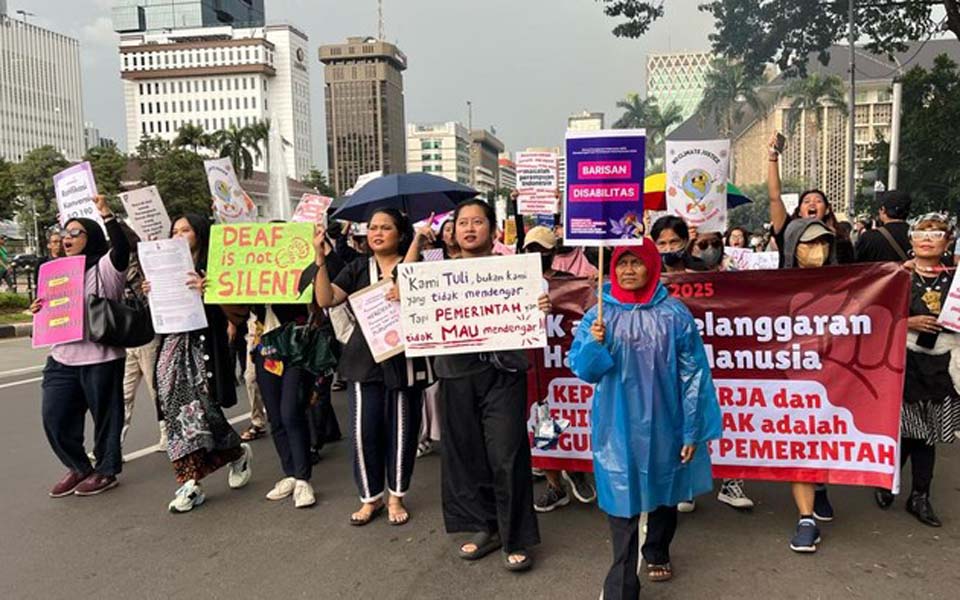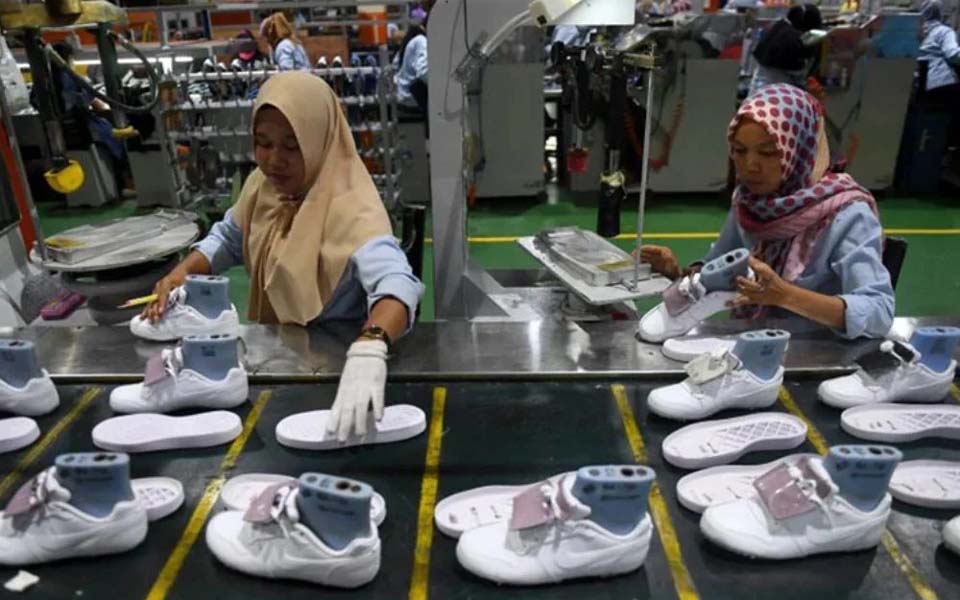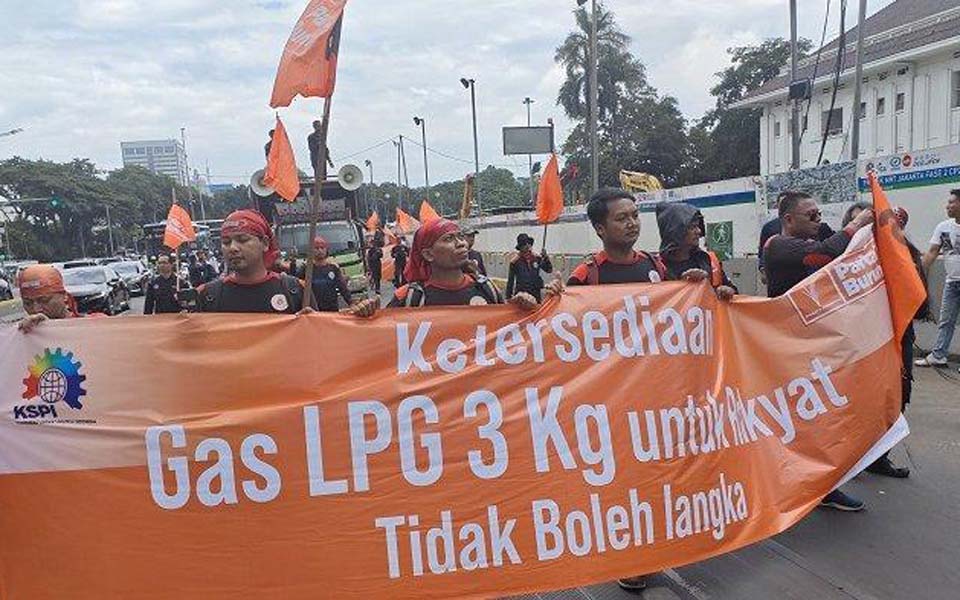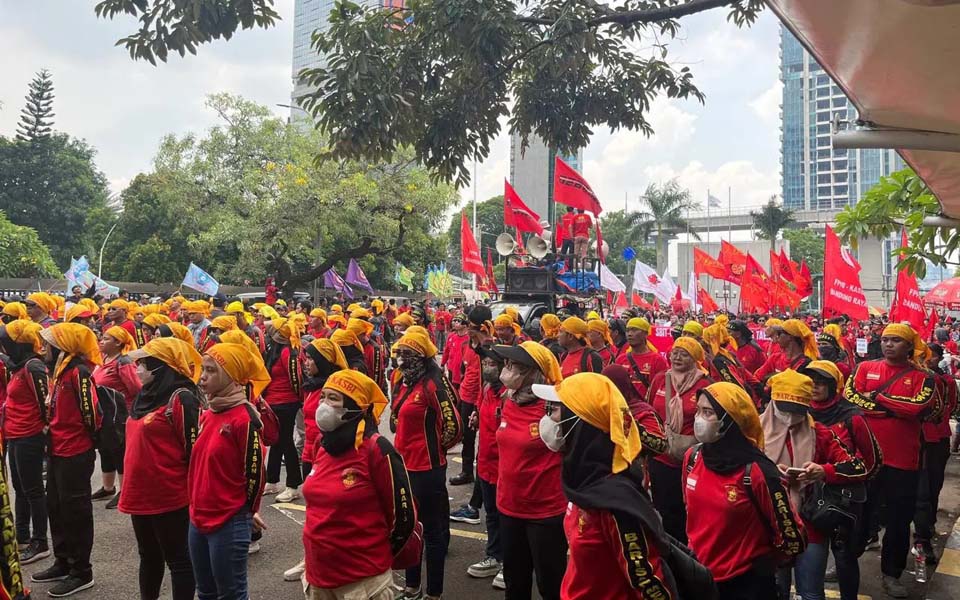At least 16 civil society groups in the West Java provincial capital of Bandung commemorated International Women’s Day (IWD) with a march on Friday March 8 demanding equality for women.
The group, calling itself the Clamber Alliance, focused on demanding rights for women workers, women’s farmers and women working in education.
Annisa Nurul Jannah from Perempuan Mahardhika (Free Women) said that women’s issues have yet to receive any attention in the lead up to the presidential election (pilpres) on April 17. The problem is that women are only seen in terms of fulfilling the 30 percent quota in parliament.
“Not one of the presidential candidate tickets took up the issue of women as one of the important issues in the [presidential] debates. They just discussed the women’s quota in parliament. ‘Oh women have already being given a 30 percent quota of seats in parliament’”, she said during a press conference on the afternoon of Wednesday March 6.
“Yet this totally fails to resolve the problems that women face. In fact the state has failed to see that women’s problems are far more crucial than that”, she added.
Menstrual and pregnancy leave difficult
In the labour sector, women often face difficulties dealing with menstrual leave, maternity leave and when giving birth. And when they are given leave, women often find that they have been arbitrarily sacked.
“Even pregnancy leave is very difficult. It is not infrequent that pregnancy leave ends in arbitrary sackings. And the grounds given by companies actually don’t make any sense”, explained Jannah.
Perempuan Mahardhika research in the Nusantara Bonded Zone (KBN) in Cakung, North Jakarta, found that 50 percent of women workers are afraid of becoming pregnant.
The five-month survey gathered data from 773 workers in 45 factories. The survey found that 25 percent of pregnant women workers are still obliged to work overtime and 4 out of 25 women who are pregnant hide their pregnancies. Yet pregnancy and maternity leave are guaranteed under the 2003 labour law.
However Supinah from the National Trade Union Confederation (KSN) says that the law is not firmly implemented.
“But in practice almost all companies don’t follow it or don’t implement it, they don’t obey the labour law, here it clearly has a great influence, harming women workers themselves”, she said.
Supinah is demanding closer supervision by the government which is responsible for monitoring labour conditions. “Where does the problem lie? Weak monitoring. There is no seriousness about dealing with discrimination against women. Why? Because there are a great many who have an interest [in not doing so]”, she said.
Double burden
Meanwhile, a victim of a forced land eviction, Eva Eryani Effendi, said that agrarian and land issues result in women suffering twice over. Effendi is a resident of Tamansari Bandung who was evicted from her land by the government in 2017-2018.
Legal efforts to secure the rights of residents are still ongoing but women, said Effendi, are most impacted upon by evictions.
“Our community has collapsed and been destroyed like this and it is housewives that most of all are thinking about their children’s health in a regional situation like this. How our environment has been polluted by lots of dust, our children often fall sick”, she explained.
Effendi added that women suffer a double burden having to deal with the family and because of this they feel the impact more.
“The problem that is most felt is that [women have to deal with] all of the house work, the children, healthcare and their husbands, this is the problem women face. The problem is, how can a mother have a family, have children, in the middle of an eviction”, she explained.
Campus still not safe for women
Aside from the issue of workers and land, the issue of sexual violence also received considerable attention after last year’s rape of Gajah Mada University (UGM) student Agni. Clamber Alliance member Rico Saputra said that campuses are still not safe places for women.
“Sexual harassment and violence are in fact legitimised by tertiary education authorities. Of course we are still hot on the issue with the Agni case, about how the Gajah Mada University elected a peaceful path to resolve the rape case that occurred”, explained Saputra.
In the Agni rape case, the UGM has still not handed down any academic sanctions whatsoever against the perpetrator known by the initials HS. The rectorate even facilitated a meeting between the perpetrator and the victim and consider the problem to have been resolved peacefully. Yet Agni’s supporters say that she has only accepted the apology, not stopped pursuing the case.
“Tertiary education institutions must side with victims, but instead the tertiary institution chose a peaceful resolution. This is evidence that tertiary institutions – never mind that the UGM is state run – actually legitimise cases of sexual violence”, said Saputra.
With cases of sexual violence continuing to occur, Annisa says that Perempuan Mahardhika is pushing for the enactment of the Draft Law on the Elimination of Sexual Violence (RUU PKS). The draft law, which regulates nine specific types of sexual violence, has stalled in the House of Representatives (DPR).
Support for the draft law has also been confronted by opposition from some sections of the public who believe that is not in accordance with Indonesian values. (rt/em)
[Translated by James Balowski. The original title of the article was “Peringati Hari Perempuan, Kelompok Sipil Bandung Tuntut Hak Buruh”.]















